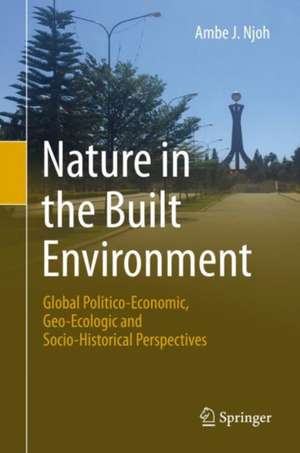Nature in the Built Environment: Global Politico-Economic, Geo-Ecologic and Socio-Historical Perspectives
Autor Ambe J. Njohen Limba Engleză Hardback – 4 mar 2020
| Toate formatele și edițiile | Preț | Express |
|---|---|---|
| Paperback (1) | 693.06 lei 43-57 zile | |
| Springer International Publishing – 4 mar 2021 | 693.06 lei 43-57 zile | |
| Hardback (1) | 642.83 lei 43-57 zile | |
| Springer International Publishing – 4 mar 2020 | 642.83 lei 43-57 zile |
Preț: 642.83 lei
Preț vechi: 756.27 lei
-15% Nou
Puncte Express: 964
Preț estimativ în valută:
123.04€ • 133.70$ • 103.42£
123.04€ • 133.70$ • 103.42£
Carte tipărită la comandă
Livrare economică 21 aprilie-05 mai
Preluare comenzi: 021 569.72.76
Specificații
ISBN-13: 9783030397586
ISBN-10: 3030397580
Ilustrații: IX, 209 p. 6 illus.
Dimensiuni: 155 x 235 mm
Greutate: 0.49 kg
Ediția:1st ed. 2020
Editura: Springer International Publishing
Colecția Springer
Locul publicării:Cham, Switzerland
ISBN-10: 3030397580
Ilustrații: IX, 209 p. 6 illus.
Dimensiuni: 155 x 235 mm
Greutate: 0.49 kg
Ediția:1st ed. 2020
Editura: Springer International Publishing
Colecția Springer
Locul publicării:Cham, Switzerland
Cuprins
Chapter 1. Environmental Stewardship and Built Space.- Chapter 2. PESTECH and Nature in Built Space: Analytical Framework.- Chapter 3. Nature in Built Space in Sub-Saharan Africa.- Chapter 4. Nature in Built Space in the MENA Region.- Chapter 5. Nature in Built Space in Asia and the Pacific.- Chapter 6. Nature in Built Space in Latin America and the Caribbean.- Chapter 7. Nature in Built Space in North America.- Chapter 8. Nature in Built Space in Western Europe.
Notă biografică
Ambe J. Njoh is a Professor of Environmental Science & Policy at the University of South Florida (USF), USA. He graduated with a Ph.D. in Planning Studies from the University of London’s Bartlett Development Planning Unit, Bartlett School of Architecture & Planning. Prior to earning the Ph.D., Njoh had completed a Masters of City & Regional Planning (MCRP) from the School of Architecture at the University of Oklahoma, and a Diploma in Civil Engineering Technology from the Advanced School of Public Works in Cameroon. Before becoming part of the teaching staff at USF, he served as Transit Planning Manager at the Florida Department of Transportation, Tallahassee, Florida. He was the Pioneer Director of the Urban & Regional Planning Program at USF from 2009 to 2014. Professor Njoh has written 11 books, and more than 100 peer-reviewed articles, book chapters, and technical reports. Many of his peer-reviewed publications are on community participation in water and sanitation service provisioning, renewable energy policy and systems, and land use policy. His two most recent books are Urban Planning and Public Health in Africa published by Ashgate (2014), and French Urbanism in Foreign Lands, published by Springer (2016).
Textul de pe ultima copertă
A good understanding of the status quo is necessary for the success of efforts to develop and maintain nature in built space. Accordingly, this book conducts an environmental scan of the context of these efforts in global perspective. In particular, it develops and employs a novel environmental scanning model (ESM) designed to rigorously analyze the political, economic, social, technological, ecological, cultural and historical (PESTECH) contexts of initiatives to promote biodiversity in the built environment. The focus is on four specific substantive areas of environmental policy, namely forestry, water, food, and energy. The units of analysis roughly correspond with the major United Nations Environmental Programme (UNEP) regions of the world, including sub-Saharan Africa, Middle-East and North Africa, Asia and the Pacific, Western Europe, North America, and Latin America and the Caribbean.
Caracteristici
Analyzes Community Participation Initiatives in Urban Biodiversity and Ecological Conservation Efforts Provides an In-Depth Focus on the Urban-Natural Environment Nexus Emphasizes the Need to Integrate Nature into Built Space
